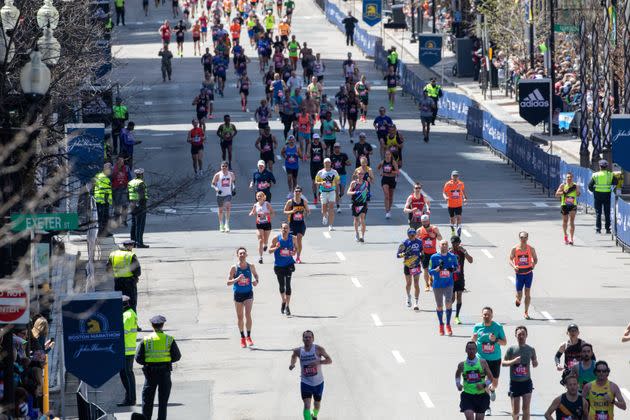Boston Marathon To Make Race More Inclusive For Nonbinary Runners
Organizers of next year’s Boston Marathon announced Monday that nonbinary athletes will be allowed to run the prestigious race without having to register as members of the men’s or women’s divisions.
The Boston Athletic Association said that it is “currently working on expanding opportunities” for nonbinary athletes, not just at the marathon but also at the other races the association administers.
Registration opened Monday for the 127th Boston Marathon, scheduled for April 17 next year. The BAA is expecting a field of about 30,000 for the race, one of the most competitive in the world.
According to the organization, nonbinary athletes who have completed a marathon as a nonbinary participant during the current qualifying window can apply for the 2023 Boston Marathon. Entry into the event will be determined by the athlete’s submitted time and the marathon’s overall field size limit. The registration application will include a nonbinary gender option for runners to select.
“While we do not currently have qualifying standards for non-binary athletes, we are working on ways non-binary participants are accepted into the event,” the BAA said. “Discussions are ongoing with non-binary athletes in an effort to further promote inclusion at all BAA events.”

Athletes compete in the Boston Marathon on April 18, 2022. Organizers of next year’s Boston Marathon announced that nonbinary athletes will be allowed to run without having to register as members of the men’s or women’s divisions. (Photo: Lauren Owens Lambert/Anadolu Agency via Getty Images)
The BAA said that it does not yet have enough data to establish qualifying times specific to nonbinary runners since the 2023 race will be the first to specifically include nonbinary athletes. But the organization encouraged nonbinary runners to use the women’s division qualifying standards this year because they are inclusive of the athletic standards that need to be met in the existing men’s and women’s categories.
“As we prepare for future races, participants can expect non-binary times to be updated accordingly,” the association said. “We view this first year as an opportunity to learn and grow together.”
Nonbinary runners between ages 18 and 34 must have run a qualifying marathon time of 3 hours and 30 minutes or faster from Sept. 1, 2021, until now. The qualifying time increases with each age group and allows nonbinary runners to train with specific qualifying times in mind.
“Personally I’m so excited to know what I need to do to qualify for a bucket-list race, and thrilled that my community of nonbinary runners is being acknowledged by the Boston Athletic Association,” J Solle, a nonbinary runner and director at large of queer running club Front Runners New York, told The 19th.
The Boston Marathon is the latest major race to start adding nonbinary divisions. Last year’s Philadelphia Distance Run — which includes a half marathon and a 5K — became the first large race in the country to create a nonbinary division and offer equal prize money.
The Brooklyn Marathon and Half Marathon followed suit earlier this spring, with 82 registered nonbinary participants among the finishers, according to The Associated Press. The momentum is largely thanks to nonbinary runners pushing for more inclusivity in running.
This article originally appeared on HuffPost and has been updated.
